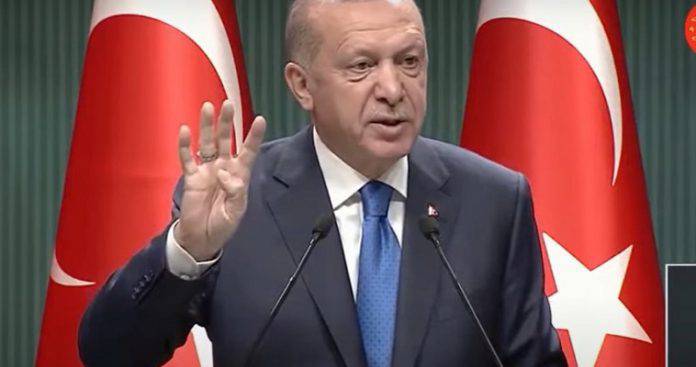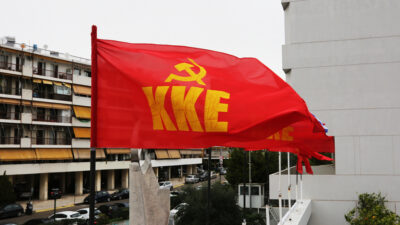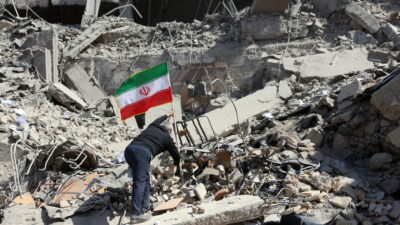Themis Tzimas: How Turkey will fight – Erdogan describes his next moves
10/09/2020
Contrary to the outrageous idiom of the Greek establishment and the domestic media whenever they refer to statements by Turkish officials and the President of Turkey, Erdogan is not talking crazy nor is he threatening with a “hot incident”. On the contrary, he clearly describes under what conditions and how he will attack Greece.
Erdogan, who despite his perhaps even strategic mistakes, is one of the most capable leaders of our time, and is following in his foreign interventions a (neo-) Ottoman, pragmatic model: after ensuring the non-intervention of either the US, or Russia, gives a brief window to his enemy offering the possibility of voluntary concession to what Turkey demands and then attacks (neo-Ottomanism).
If he is not satisfied with his opponent, without conflict, a scalable process begins. It starts first with “small” invasions and incidents, in order to gain bridgeheads (military and political) and then, usually with the spearhead of jihadists and therefore not the Turkish army, he “raises and lowers” the escalation of a war. He does this with a small, comparatively, for him economic and human cost, graying territorial territory, always with the firm principle that “where the Turkish flag goes up it does not go down”.
By becoming part of the problem and having territorial gains, he becomes at the same time part of the “solution”. Where the solution for Turkey is the, in various ways, legalization of the fait accompli. In fact, in order to stabilize his hold, he modifies the population composition where he can, or he satellites the governments, or he cooperates as he sees fit with local actors, supposedly representatives of the populations and the areas that concern him.
With the assistance of Athens
In other words, he utilizes a combination of proxy warfare, a direct involvement of the Turkish military, and doctrines of change of government introduced by the United States. This is what he did in Iraq, Libya, and Syria. In fact, in the last two cases, he achieved this with the catastrophic and guilty (not to say something more serious) synergy of the Greek governments of George Papandreou, Antonis Samaras, Alexis Tsipras, and Kyriakos Mitsotakis.
These governments cooperated and supported the change of governments in Libya and Syria within NATO, especially those forces that are currently fighting together with Erdogan and soon perhaps against Greece. So when the Turkish president informs us that we have to look at what he has done in the last four years to understand “what awaits us”, he is saying it literally.
In addition to psychological warfare against Greece and strengthening his morale in the form of preparation for a civil war at home, he describes the sequence of movements that he will follow, if we do not surrender unreservedly to his demands, with the adjustments required by the position and the strength of our homeland. The Turkish president demands that we join his agenda as a whole.
He will not take one step back unless, after or before the war, he is defeated, or forced to retreat. This allows time to pass, either to secure US and Russian tolerance (although it may seem that he may have already secured it for a supposedly limited incident), or to intensify an international “public relations” campaign.
In this context, he lays down three issues. He speaks of human rights violations in Western Thrace and refugees. He mentions Kastellorizo, in terms of its size and its impact on the Turkish EEZ. Finally, he proposed the militarization of the Aegean islands, as being an alleged threat to Turkey.
Pressure on all fronts
He wants to construct the image of a great leader, but he is forced to react, aiming with each of the three issues at different audiences. At the same time he is exerting an increasing pressure on all fronts. In July, the question was whether the “Oruc Reis” would launch seismic surveys. The Greek red line has remained at the levels of 1987. Today Oruc Reis is sailing around and is conducting research, without any disturbance. Now the question has shifted to whether it will enter Greek territorial waters.
Even at six nautical miles and a meter it will sail undisturbed, while the return to Antalya will be considered a de-escalation move, which will be credited to the Turkish president, although it will in fact be a common ultimatum. He has already succeeded in convincing Greece not to delimit the EEZ with Cyprus and to charge our country with the agreement with Egypt as an, more, or less, aggressive action towards Turkey.
If Greece does not buckle down again, the next moves are an incident of a military nature that will escalate to an Aegean island or Evros – in the latter case perhaps without the direct involvement of the Turkish army but jihadists – or a move – e.g. a drilling rig – in order for either Greece to be humiliated, or to be dragged into conflict in the field and in the area that will be convenient for Turkey.
After the beginning of a military incident, a taboo will have been broken, as was once the case in Syria. Turkey will seek to occupy territory, an island or in Evros. Erdogan’s goal is for Greece to hasten towards a de-escalation, which will go through de facto recognition of what has been done. Turkey has measured that Greece, instead of putting forth its defense, is putting forth de-escalation in every way. An attitude that is a prelude to defeat at any given time.
The effects of appeasement
Erdogan therefore believes that Greece will not go to war on all fronts and for the long-term. The policies of appeasement adhered to by most parties in Greece and the government are perpetuating such views. If he does not succeed in occupying territory, he will accept an international conference with the aim of consolidating “de-escalation zones”, ie zones of non-existent Greek sovereignty within our territory (see Syria).
Then he will be able to set up incidents and expand them at will, while Greece will be trapped in a spiral of constant crises. In addition, he strategically plans to establish bases in Libya and Albania in the future, in order to encircle Greece and cancel its defense. It is therefore a matter of survival or destruction:
- First, Greece must be strengthened defensively and the people must hear the truth from the political leadership, as a whole: there is a danger of war and we must be prepared.
- Second, those who looted (legally or illegally) public finances, such as shipowners, should pay. Retirees can not see their pension endangered in favor of national defense and the hugely wealthy are not accountable.
- Thirdly, to make it clear through a council of political leaders that any use of force by Turkey, or against the threat of our sovereignty, will mean a generalized war of attrition.
- Fourth, Greece must acquire an “eastern” policy. It must also be linked to Russia, as well as to the forces fighting against Turkey (Syria, etc.), strategically.
- Fifth, to make aggressive diplomatic moves, in addition to the above that would change the terms of the game. To delimit the EEZ with the Republic of Cyprus and, if possible, with Libya through its parliament, as the Libyan parliament has called on Greece to do.
- Sixth, to cancel in various ways, without excluding any option whatsoever, the strategic encirclement of Greece before it is too late. We will not exorcise evil by turning a blind eye to it. We have to change the terms of the game and surprise those on the other side of the Aegean.





